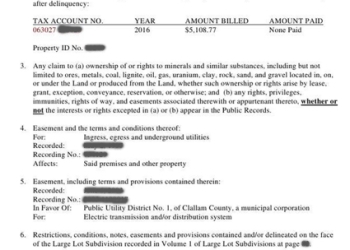Title insurance is a wise purchase. Truth is stranger than fiction. Imagine purchasing a beautiful piece of real estate intended to be your retirement property and getting stuck with a judgment which was not on the record when you bought your property. It happened to Helmuth and Beverley Prochaska in Whatcom County, Washington.
Title Insurance Necessary?
This article reviews the recent Washington Appellate case of Prochaska v. Midwest Title Guaranty Co., 85 Wn. App. 256 (March, 1997). You’ll see the importance of title insurance.
 The Prochaskas moved here from South Carolina. They went through the normal and cautious procedures to purchase their dream property: they included financing contingencies in the Purchase & Sale Agreement, and they obtained and paid for a title insurance policy. The purpose of the title insurance policy, of course, was to insure that they would get a clean title, free from encumbrances of any kind. They did everything you would do in a normal transaction.
The Prochaskas moved here from South Carolina. They went through the normal and cautious procedures to purchase their dream property: they included financing contingencies in the Purchase & Sale Agreement, and they obtained and paid for a title insurance policy. The purpose of the title insurance policy, of course, was to insure that they would get a clean title, free from encumbrances of any kind. They did everything you would do in a normal transaction.
Title Insurance and Real Estate
Disaster strikes! Nine (9) minutes before the title company recorded the Prochaska’s statutory warranty deed, an out-of-state judgment against the seller of the property was recorded with the Whatcom County Superior Court clerk. Two days later the Superior Court clerk entered the judgment on the official court records (also known as the execution docket). So the judgment was not actually discoverable by anyone who searched the public records until two days after the Prochaska’s deed was recorded.
To be sure there is no misunderstanding, I want to state the dates and the times. The out-of-state judgment (against the seller) was filed on September 14, 1988, at exactly 10:05 a.m., and the Prochaska’s statutory warranty deed was recorded on September 14, 1988, at exactly 10:14 a.m. Recall that the judgment did not get recorded on the records by the clerk until September 16, 1988. Was there title insurance?
Most of us would conclude that the Prochaskas own the property and are ahead of the judgment, or to say it another way, the judgment did not attach to the Prochaska’s property since the judgment against the seller came after the closing and recording to the Prochaskas.
Not so, says the Washington Appellate Court. Listen up, because this decision is a title company’s worst nightmare, and it could also create a problem for a buyer. It deals with an age old problem for title companies, but the court inks what one would only hope could not be.
The court bases its ruling on technical interpretations of the law and this has everything to do with title insurance. As many of us know, judges can give us some incredible law this way. The court hangs its hat on the fact that RCW 4.56.200 establishes that a judgment becomes a lien on real property upon filing with the county clerk. Apparently, it is so what if the clerk doesn’t get the judgment entered in the public record for a couple of days later. The court goes on to say that the Prochaskas had constructive notice when the judgment was filed, even though there was no possibility they could have discovered it until September 16th.
Concluding, the court says that the out-of-state judgment is a lien on the property (a $100,000 lien), and the Prochaskas are stuck with it. The court politely says that the Prochaska’s remedy is to go after the seller or the insuring title company on the protection afforded in the title insurance. Guess who is going to get stuck with the bill? Right! The title company, because as in most cases, the seller is like the turnip from which you can get no blood. By the way, the title company did a good job closing this transaction, and there was nothing the title company could have done to prevent this whole scenario.
Title Insurance is Cheap
Now, does anyone want to complain about the small premium you pay your title company for taking huge risks? Not me. In my opinion, the title companies do not charge enough to close and insure your title. Title insurance is a bargain.
Last Updated on September 20, 2019 by Chuck Marunde





























Wow! Great description of what can happen if you don’t get title insurance. It is, in fact, the only way to protect yourself from this kind of scenario.